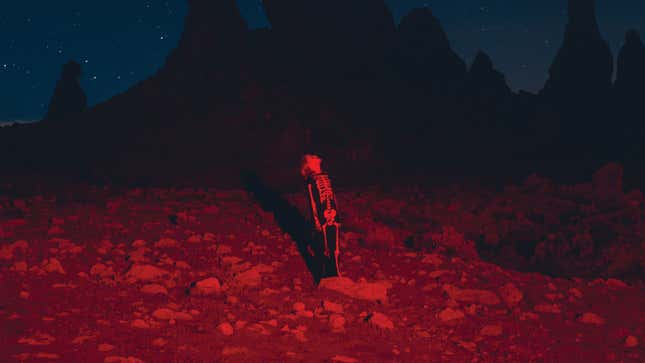

On the last song of singer-songwriter Phoebe Bridgers’s Punisher, the daily grind of a touring musician becomes an ominous blur. The landscape (it could be Germany or the worst part of Texas, she isn’t sure) rushes by an open car window: a slaughterhouse, an outlet mall, slot machines. She dreams that three clicks of her shoes might get her home, but Bridgers knows her “home” is more than just a room to sleep in these days. “I’ll find a new place to be from: a haunted house with a picket fence, to float around and ghost my friends,” Bridgers sings on “I Know the End.” “I’m not afraid to disappear, the billboard said ‘The End Is Near.’”
Bridgers’s sophomore album Punisher is about disappearing, but also displacement. Locations and places collapse into one another like dominoes; one minute Bridgers is scoping out a Japanese 7-Eleven in the song “Kyoto,” and suddenly she’s bemoaning the state of Sunset Boulevard, preferring to watch “chem trails” from a suburban Goodwill parking lot. On “Garden Song,” a movie screen in a dream suddenly transports her to a dorm room, labyrinth as a “hedge maze.” Home is a respite, but it’s also treated like a layover town. “She could go home, but she’s not going to,” Bridgers sings of her roaming subject on the folksy “Graceland Too.”
As a songwriter 25-year-old Bridgers has established herself as an expert witness, immortalizing the decay of relationships and her own anxious personal identity in writing. On her debut album’s best song “Motion Sickness,” she sang of a break-up in piercing detail with lyrics like: “Why do you sing with an English accent?/I guess it’s too late to change it now.” But on Punisher, Bridgers’s writing often turns its gaze outward, frequently circling Los Angeles, where she currently lives. In an interview with The New Yorker, Bridgers said that Joan Didion was an influence on the album, which she says contains “lots of California and lots of fucking ghosts.” There’s a disorienting, dreamlike quality to Punisher, the songwriting unraveling like a gothic Francesca Lia Block novel. Bridgers has always had an affinity for the macabre (she name-dropped Jeffrey Dahmer on her debut, Stranger in the Alps) and burnouts, evangelicals, skinheads, vampires, and ghosts stalk the streets and songs here. In a city of transplants, any corner could reveal the presence of an alien spaceship.
The way Bridgers cracks Los Angeles’ facade, pushing all night drugstores and suburban parking lots into frame to expose its mundanity, reminds me of Kim Gordon’s No Home Record and Lana Del Rey’s Norman Fucking Rockwell from last year. All three ebb with a darkness that destroys urban life: climate change, gentrification, death, as an ambient backdrop for personal anxieties. Throughout Punisher, Bridgers traipses through cities, and from the corner of her eye catches them aflame. “They killed a fan down by the stadium, was only visiting, they beat him to death,” she relays coolly on “Halloween.” Like an inversion of the highly romanticized flâneur, Bridgers faces the city’s excess and propulsive movement not with excitement but numbness.
“I want to believe that if I go outside I’ll see a tractor beam,” Bridgers sings on “Chinese Satellite.” “Coming to take me to where I’m from.” Home on Punisher is more a stand-in concept for feeling anchored in one’s life; on one song, Bridgers gets literally locked out of her home and takes the opportunity to think about how she’s been “playing dead my whole life.” Bridgers has spoken about her depression and feelings of dissociation in interviews, which she’s described as “stay home all day” depression and trying to outline a nebulous self. “When I’m on tour… I put on a ‘me’ costume when really I feel like wearing pajamas all day,” Bridgers said. “Sometimes I’ll do interviews about the first record, and I feel like I’m just making up my answers; like I’m answering somebody else’s questions.”
On Punisher, the blur of urban life, haunted by ghosts, becomes the perfect shadow for Bridgers, still figuring out who she is, to recede into. When Bridgers echoes the apocalyptic billboard screaming “The End Is Near” in the album’s final moments, it sounds less like an ominous prediction for humanity’s fate and almost like a personal affirmation; all her wandering will finally lead her home.